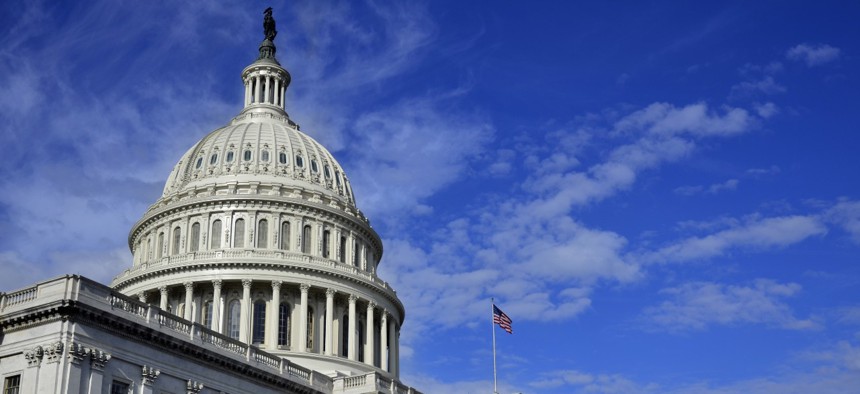
By Lane V. Erickson / Shutterstock.com
Viewpoint: Congress Desperately Needs a Contingency Plan
What will happen if lawmakers can no longer meet because of the coronavirus?
What happens if the coronavirus pandemic reaches a point that requires all travel and mass gatherings in the United States to be suspended—and members of Congress cannot meet in the Capitol or elsewhere in Washington? What happens if enough members of Congress catch the virus, or are quarantined, that there is no longer a quorum to meet and conduct business? How, in such a circumstance, would Congress pass laws to address containment, treatment, and appropriations, or even exercise oversight of an administration that cannot be trusted to act appropriately?
The answer to these questions is frightening. There is no plan in place for Congress to hold remote meetings or otherwise conduct its business if it becomes impossible for its members to meet together, face to face in the Capitol or at another site in the District of Columbia. And that needs to change, right now.
On the morning of September 11, 2001, I was boarding my flight at Dulles airport when I and my fellow passengers were called back back from the jetway—the second plane had hit the World Trade Center, making it clear that a terrorist attack was under way. I made my way home, watched the coverage, and came to a startling conclusion by mid-afternoon—United Flight 93, which had just crashed in Pennsylvania, had been headed for the U.S. Capitol, and if it had left New Jersey on time instead of 45 minutes late, it would likely have struck the cast-iron Capitol dome around the same time another plane hit the Pentagon. That could have resulted in the deaths or incapacitation of hundreds of members of Congress, eliminating the constitutionally required quorum until special elections could be held to replenish the House.
Brian Baird, a U.S. representative from Washington State, caught in the chaos on Capitol Hill that morning, had the same revelation. And when I wrote a column pointing out that we had no plan in place to get Congress up and running quickly in a genuine emergency, he contacted me. Together, we began a long and ultimately futile effort to create robust continuity plans for all three branches of government, and for our elections, to fit the 21st century. That meant looking not just at the possibility of devastating terrorist actions, but also at the challenges of natural events like hurricanes, earthquakes, or pandemics. The anthrax scare that hit Capitol Hill soon after 9/11 underscored the dangers of that last threat.
Baird worked in the House, and our ally John Cornyn worked in the Senate. Together with Tom Mann, of the Brookings Institution, and my colleague at the American Enterprise Institute, John Fortier, I helped create a Continuity of Government Commission. That commission was co-chaired by former White House Counsel Lloyd Cutler and former Senator Alan Simpson, who had encouraged its creation.
Our commission issued three reports—on the continuity of Congress, the presidency, and the Supreme Court—and we wrote articles on ensuring the continuity of elections. We had hearings in both houses of Congress, and the Senate Judiciary Subcommittee on the Constitution reported out a constitutional amendment to create temporary, emergency appointments to the House and Senate in the event of a catastrophe that dropped either house below a quorum of half its members; for the Senate, in particular, that included mass incapacitations. That amendment, notably, was sponsored by both Republican John Cornyn and Democrat Russ Feingold, but it went nowhere.
Nor did any of our other recommendations. House Speaker Dennis Hastert took little interest in the subject. He also had to deal with staunch and irrational opposition to any action from two powerful chairs, Jim Sensenbrenner of the Judiciary Committee and David Dreier of the Rules Committee. Dreier objected that no House member had ever served without first being elected. But if the House could not muster a quorum, inaction might mean that there would be no House at all, or else produce a House filled in slapdash fashion, with sham elections held on little notice, that would in no way be representative of the voters’ desires. Under pressure, the House did designate Fort McNair as an alternative site where it could convene, but did nothing else of consequence. The Senate did nothing at all.
To be fair, the largest reason for inaction was that few members of Congress wanted to grapple with an issue that involved their own possible deaths—the same reason that many smart, educated people do not write wills. And superstition plays a role, as well. I should add that my pleas to Vice President Dick Cheney to deal with the outmoded Presidential Succession Act, which is filled with inconsistencies and loopholes, and to Chief Justice John Roberts to focus on Supreme Court succession, for which the only existing plan is a statutory quorum of six justices to conduct any business, also fell on deaf ears.
Every year since 2001, I have renewed my efforts to deal with these continuity issues, which includes the prospect that elections could be disrupted by malign foreign or domestic actors, by electrical-grid outages, or by increasingly violent and early climate emergencies—if the Category 5 hurricane that struck the panhandle of Florida in October 2018 had come a couple of weeks later, and had hit Pensacola with force, the gubernatorial, senatorial, and House elections in that state would have been dramatically affected. And our presidential election in November is now vulnerable to disruption, as well.
Before Congress is forced to self-quarantine, it must act. First, Congress needs to pass a plan that allows for a virtual Congress, an idea originally proposed after 9/11 by Representative Jim Langevin of Rhode Island. And. at the same time, Congress needs to put into place the most sophisticated and secure remote-meeting software and hardware for its members. Every congressional committee and subcommittee needs to develop the same capacity, with the same authority. If members have to work from their district offices or even from home, they will need the ability not just to meet remotely, but to cast secure votes when necessary.
We also need, urgently, a plan to deal with the possibility that our election in November will be disrupted, if the pandemic makes voting at the polls difficult or dangerous. At a minimum, Congress should pass a law to allow no-excuse absentee balloting in every state for federal elections, while urging states that have no such requirement to do the same for state and local elections. And, ideally, we need a plan to deal with other possible election disruptions for which we have no options or workable alternatives in place. Leaving states to respond ad hoc is not a good way to deal with the many possible disruptions and dislocations. Senate Majority Leader Mitch McConnell could also help by upholding his patriotic duty and allowing quick votes on the many bipartisan plans to combat Russian or other foreign interference in our elections. And we need to make sure that President Trump does not misuse his emergency powers to postpone or cancel the election.
After the lack of a congressional response following 9/11, I always feared that Congress would fail to act until a debilitating disaster hit, when it would be too late to combat it with logic and reason. We can’t afford to wait any longer before preparing for the worst.
Norm Ornstein is a contributing writer for The Atlantic, a contributing editor and columnist for National Journal, and a resident scholar at the American Enterprise Institute for Public Policy Research.







